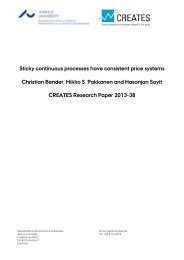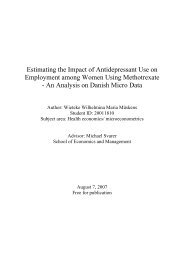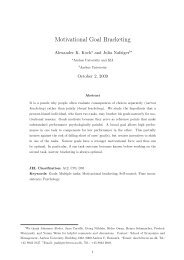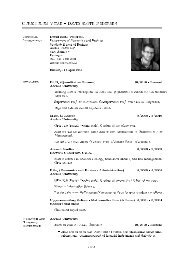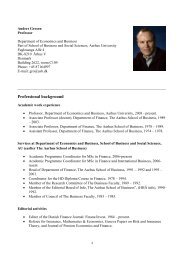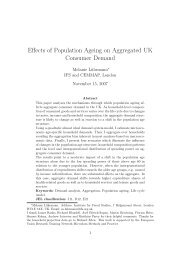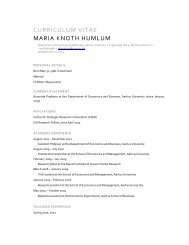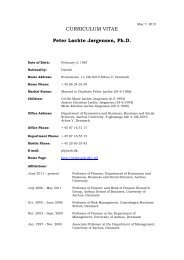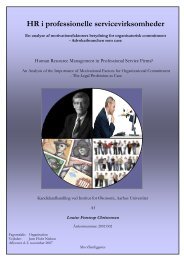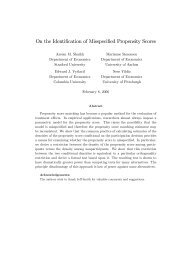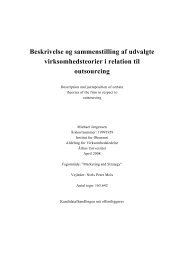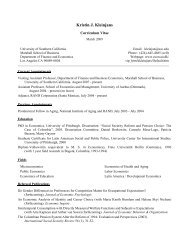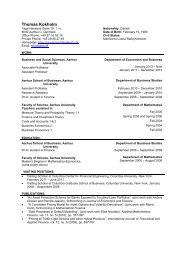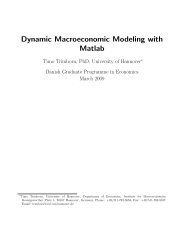Job Assignments under Moral Hazard - School of Economics and ...
Job Assignments under Moral Hazard - School of Economics and ...
Job Assignments under Moral Hazard - School of Economics and ...
You also want an ePaper? Increase the reach of your titles
YUMPU automatically turns print PDFs into web optimized ePapers that Google loves.
in the hierarchy <strong>of</strong>ten put low dem<strong>and</strong>s in terms <strong>of</strong> the inputs ability <strong>and</strong> effort. Hence,<br />
in the low ability job success might be quite likely even without hard work (i.e., it is is<br />
a relatively easy task). In the high ability job, if the agent does not work hard, there<br />
is a bigger drop in expected output (i.e., it is a more difficult task for him). Seeing<br />
such an agent succeed in what is for him a difficult job, thus, indicates that he must<br />
have worked hard. So the high ability job poses a harder test <strong>of</strong> the agent’s effort than<br />
the low ability job, <strong>and</strong> this makes it less costly to get the agent to exert effort. That<br />
output in the higher level job is <strong>of</strong>ten more informative about the agent’s effort than<br />
output in the lower level job is a view also found in the literature (Baker, Gibbons,<br />
<strong>and</strong> Murphy 1994, Maskin, Qian, <strong>and</strong> Xu 2000, Ortega 2003). As we show, the reduced<br />
cost <strong>of</strong> incentives (due to differences in informativeness about effort across hierarchy<br />
levels) outweighs the negative effect <strong>of</strong> a lower success probability near the ability cut<strong>of</strong>f<br />
level for efficient job assignment. Hence, the principal sets a lower ability threshold for<br />
assignment to the more informative higher hierarchy level than is efficient.<br />
The mechanism at work is a static one: the job assignment decision in one period affects<br />
the contemporaneous cost <strong>of</strong> providing incentives. This static mechanism on its own<br />
<strong>of</strong>fers several new insights into the driving forces governing promotion decisions in firms.<br />
Embedding our model in a stylized dynamic framework <strong>and</strong> extending it to allow for<br />
continuous effort, we show that it may be optimal for a firm to promote an employee to<br />
a higher level job even though it knows that he will be less productive than he could be<br />
in his previously held position. This finding provides a new perspective on possible roots<br />
<strong>of</strong> the Peter Principle: even in ideal circumstances where a firm is perfectly aware <strong>of</strong> its<br />
employees’ abilities one may find employees in jobs for which they are not well suited.<br />
Our analysis highlights that promoting an employee to a job for which he is less com-<br />
petent need not lead to an observed decline in output – a narrow definition <strong>of</strong> the Peter<br />
Principle <strong>of</strong>ten used in the literature (e.g. Lazear 2004). Output may actually rise be-<br />
cause the promoted agent works harder – hiding the fact that he actually is untalented<br />
for his new job. Existing theoretical treatments <strong>of</strong> promotions in firms have ignored<br />
this effect <strong>of</strong> job assignments on implemented effort levels: they either abstract from<br />
incentives altogether or assume that effort is constant across hierarchy levels. This effect<br />
may, however, be an important driving force for promotion decisions, as our analysis<br />
shows. We therefore suggest an extended definition <strong>of</strong> the Peter Principle that includes<br />
both the possibility that a promoted agent works harder or less hard than he would if<br />
he were reassigned to the previous job. Our setting with varying effort levels across hi-<br />
erarchical levels allows to show that an employee moving up the career ladder may earn<br />
more <strong>and</strong> produce more only because he has to work harder than he would in his old job.<br />
The paper is organized as follows. Next we discuss the related literature. Section 2<br />
3



